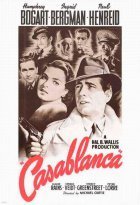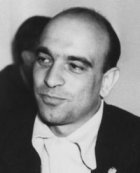
Casablanca
FADE IN:
INSERT - A revolving globe. When it stops revolving it turns
briefly into a contour map of Europe, then into a flat map.
Superimposed over this map are scenes of refugees fleeing from
all sections of Europe by foot, wagon, auto, and boat, and all
converging upon one point on the tip of Africa -- Casablanca.
Arrows on the map illustrate the routes taken as the voice of a
NARRATOR describes the migration.
NARRATOR (V.O.)
With the coming of the Second World
War, many eyes in imprisoned Europe
turned hopefully, or desperately,
toward the freedom of the Americas.
Lisbon became the great embarkation
point. But not everybody could get
to Lisbon directly, and so, a tortuous,
roundabout refugee trail sprang up.
Paris to Marseilles, across the
Mediterranean to Oran, then by train,
or auto, or foot, across the rim of
Africa to Casablanca in French Morocco.
Here, the fortunate ones, through money,
or influence, or luck, might obtain
exit visas and scurry to Lisbon, and
from Lisbon to the New World. But
the others wait in Casablanca -- and
wait — and wait — and wait .
The narrator's voice fade away...
EXT. OLD MOORISH SECTION OF THE CITY - DAY
CUT TO:
At first only the turrets and rooftops are visible against
a torrid sky.
The facades of the Moorish buildings give way to a narrow,
twisting street crowded with the polyglot life of a native
quarter. The intense desert sun holds the scene in a torpid
tranquility. Activity is unhurried and sounds are muted.
CUT TO:
A POLICE OFFICER takes a piece of paper from the typewriter,
turns to a microphone, and reads.
POLICE OFFICER:
To all officers! Two German
couriers carrying important official
documents murdered on train from
Oran. Murderer and possible
accomplices headed for Casablanca.
Round up all suspicious characters
and search them for stolen
documents. Important!
CUT TO:
EXT. A STREET IN THE OLD MOORISH SECTION - DAY
An officer BLOWS his whistle several times.
There is pandemonium as native guards begin to round up
people .
A police car, full of officers, with SIREN BLARING, screams
through the street and stops in the market.
Some try to escape but are caught by the police and loaded
into a police wagon.
At a street corner TWO POLICEMEN stop a white CIVILIAN and
question him.
FIRST POLICEMAN:
May we see your papers?
CIVILIAN:
(nervously)
I don't think I have them on me.
FIRST POLICEMAN:
In that case, we'll have to ask you
to come along.
The civilian pats his pockets.
CIVILIAN:
Wait. It's just possible that I...
Yes, here they are.
He brings out his papers. The second policeman examines
them.
SECOND POLICEMAN
These papers expired three weeks ago.
You'll have to come along.
Suddenly the civilian breaks away and starts to run wildly
down the street.
The policeman SHOUTS "Halt", but the civilian keeps going.
JAN and ANNINA BRANDEL, a very young and attractive refugee
couple from Bulgaria, watch as the civilian passes. They've
been thrust by circumstances from a simple country life into
an unfamiliar and hectic world.
A shot RINGS out, and the man falls to the ground. Above
him, painted on the wall, is a large poster of Marshal
Petain, which reads: "Je tiens mes promesses, meme celles
des autres . "
The policeman frantically searches the body, but only
finds Free French literature.
CUT TO:
We see an inscription carved in a marble block along the
roofline of the building: "Liberte, Egalite, Fraternite"
We see the the facade, French in architecture, then the high-
vaulted entrance which is inscribed "Palais de Justice".
At the entrance the arrested suspects are led in by the
police .
CUT TO:
A middle-aged ENGLISH COUPLE sit at a table just off the
square, and observe the commotion across the way in front of
the Palais de Justice.
The police van pulls up. The rear doors are opened and
people stream out.
A EUROPEAN man, sitting at a table nearby, watches the
English couple more closely than the scene on the street.
ENGLISHWOMAN:
What on earth's going on there?
ENGLISHMAN:
I don't know, my dear.
The European walks over to the couple.
EUROPEAN:
Pardon, pardon, Monsieur, pardon
Madame, have you not heard?
ENGLISHMAN:
We hear very little, and we understand
even less.
EUROPEAN:
Two German couriers were found
murdered in the desert... the
unoccupied desert. This is the
customary roundup of refugees,
liberals, and uh, of course, a
beautiful young girl for Monsieur
Renault, the Prefect of Police.
CUT TO:
Suspects are herded out of the van, and into the Palais
de Justice.
CUT TO:
EUROPEAN:
Unfortunately, along with these
unhappy refugees the scum of Europe
has gravitated to Casablanca. Some
of them have been waiting years for
a visa.
He puts his left arm compassionately around the Englishman,
and reaches behind the man with his right hand.
EUROPEAN:
I beg of you, Monsieur, watch yourself.
Be on guard. This place is full of
vultures, vultures everywhere,
everywhere .
The Englishman seems to be taken aback by this sudden display
of concern.
ENGLISHMAN:
Ha, ha, thank you, thank you very
much .
EUROPEAN:
Not at all. Au revoir, Monsieur.
Au revoir, Madame.
He leaves. The Englishman, still a trifle disconcerted by
the European's action, watches him as he leaves.
ENGLISHMAN:
Au revoir. Amusing little fellow.
Waiter !
As he pats both his breast and pants pockets he realizes
there is something missing.
ENGLISHMAN:
Oh. How silly of me.
ENGLISHWOMAN:
What, dear?
ENGLISHMAN:
I've left my wallet in the hotel.
ENGLISHWOMAN:
Oh.
Suddenly the Englishman looks off in the direction of the
departed European, the clouds of suspicion gathering.
Interrupting overhead is the DRONE of a low flying airplane.
They look up.
CUT TO:
An airplane cuts its motor for landing.
CUT TO:
Refugees wait in line outside the Palais de Justice. Their
upturned gaze follows the flight of the plane. In their
faces is revealed one hope they all have in common, and the
plane is the symbol of that hope.
Jan and Annina look up at the plane.
ANNINA:
(wistfully)
Perhaps tomorrow we'll be on
that plane.
CUT TO:
The plane SWOOPS down past a sign atop a building at the
edge of the airport.
The sign reads "Rick's Cafe Americain."
CUT TO:
EXT. AIRFIELD - DAY
As the plane lands a swastika on its tail is clearly
visible. It taxis to a stop as a group of officers march
into formation in front of it. Behind them stand a detail
of native soldiers keeping guard.
In the group is CAPTAIN LOUIS RENAULT, a French officer
appointed by Vichy as Prefect of Police in Casablanca. He
is a handsome, middle-aged Frenchman, debonair and gay, but
Translation
Translate and read this script in other languages:
Select another language:
- - Select -
- 简体中文 (Chinese - Simplified)
- 繁體中文 (Chinese - Traditional)
- Español (Spanish)
- Esperanto (Esperanto)
- 日本語 (Japanese)
- Português (Portuguese)
- Deutsch (German)
- العربية (Arabic)
- Français (French)
- Русский (Russian)
- ಕನ್ನಡ (Kannada)
- 한국어 (Korean)
- עברית (Hebrew)
- Gaeilge (Irish)
- Українська (Ukrainian)
- اردو (Urdu)
- Magyar (Hungarian)
- मानक हिन्दी (Hindi)
- Indonesia (Indonesian)
- Italiano (Italian)
- தமிழ் (Tamil)
- Türkçe (Turkish)
- తెలుగు (Telugu)
- ภาษาไทย (Thai)
- Tiếng Việt (Vietnamese)
- Čeština (Czech)
- Polski (Polish)
- Bahasa Indonesia (Indonesian)
- Românește (Romanian)
- Nederlands (Dutch)
- Ελληνικά (Greek)
- Latinum (Latin)
- Svenska (Swedish)
- Dansk (Danish)
- Suomi (Finnish)
- فارسی (Persian)
- ייִדיש (Yiddish)
- հայերեն (Armenian)
- Norsk (Norwegian)
- English (English)
Citation
Use the citation below to add this screenplay to your bibliography:
Style:MLAChicagoAPA
"Casablanca" Scripts.com. STANDS4 LLC, 2025. Web. 20 Jan. 2025. <https://www.scripts.com/script/casablanca_57>.



Discuss this script with the community:
Report Comment
We're doing our best to make sure our content is useful, accurate and safe.
If by any chance you spot an inappropriate comment while navigating through our website please use this form to let us know, and we'll take care of it shortly.
Attachment
You need to be logged in to favorite.
Log In